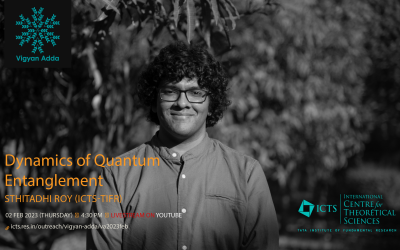Abstract:
Quantum entanglement is one of the central tenets of quantum mechanics. In fact, it can be understood as the notion that distinguishes what is truly quantum from classical about the state of a system. Loosely speaking, entanglement between different parts of a system can be thought of as there existing complicated correlations between the different parts and the information of the state being encoded collectively across all the constituents. As such, each constituent cannot be described independently of the other. In this talk, I will put these ideas on a formal footing and introduce the ideas of entanglement entropies as a quantitative measure of entanglement. Having introduced the notion of quantum entanglement, in the next part of the talk, I will discuss its dynamics. Quantum mechanics can be operationally understood as a theory of unitary dynamics and projective measurements. I will explain how these two players compete against each other in terms of their effect on the dynamics of entanglement and in fact, give rise to new kinds of dynamical phase transitions between phases characterised by their entanglement structure. Finally, I will discuss some ideas that experimentalists have been using to measure entanglement entropies in laboratories.
About the Speaker:
Sthitadhi Roy is a theoretical physicist at the International Centre for Theoretical Sciences-TIFR, Bengaluru who works at the interface of quantum condensed matter and statistical physics. His current research interests revolve around the out-of-equilibrium dynamics of quantum many-body systems with a certain focus on disordered systems and quantum entanglement. He obtained his undergraduate degree (M.Sc integrated) from IIT Kanpur in 2013 and pursued his doctoral research at the Max-Planck-Institute for Physics of Complex Systems, Dresden, Germany where he finished his PhD in 2017. Before joining ICTS-TIFR, he spent a little over four years at the Rudolf Peierls Centre for Theoretical Physics, University of Oxford.



